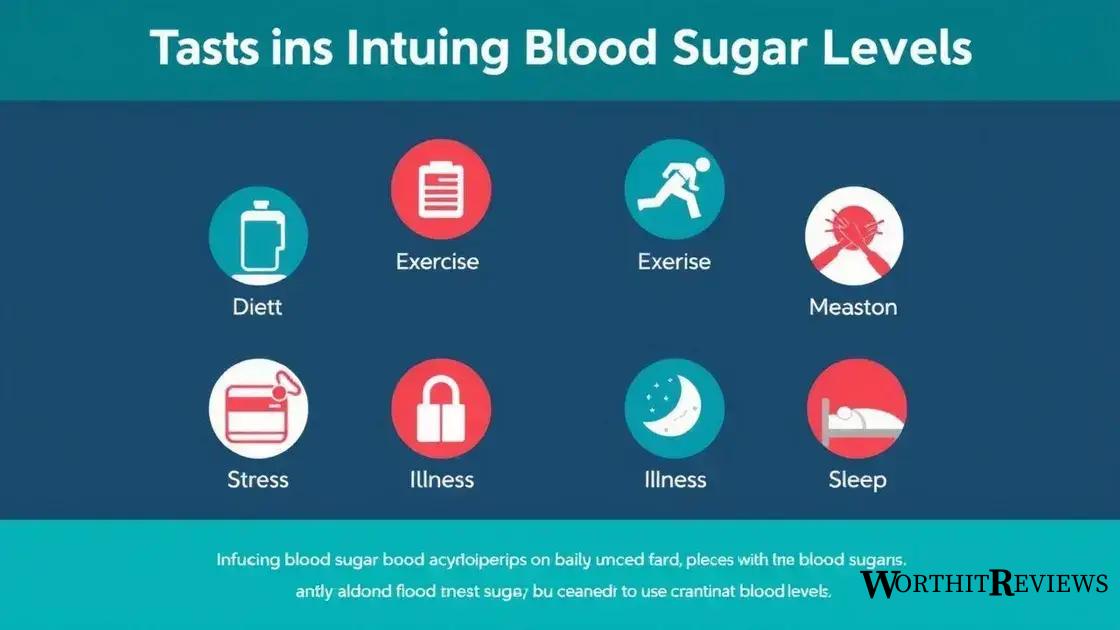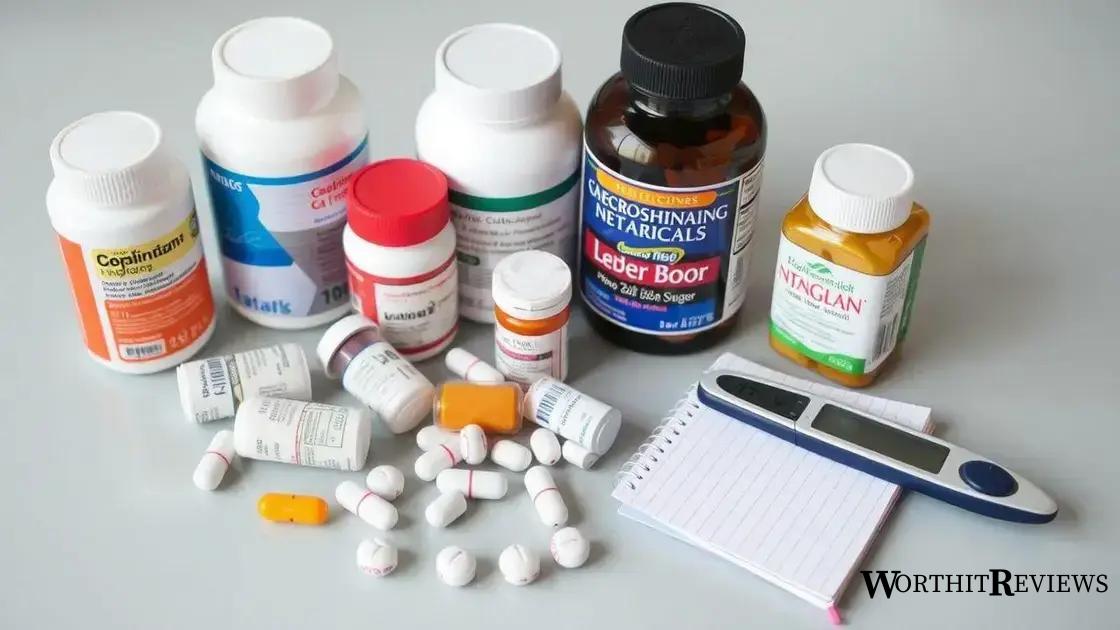The blood sugar range for type 2 diabetes typically targets fasting levels of 80-130 mg/dL and post-meal levels of less than 180 mg/dL, making regular monitoring essential for effective management.
Are you aware of the blood sugar range for type 2 diabetes? Knowing this can significantly impact your health and daily life. It’s crucial to stay informed about your levels, and this article will guide you through the essentials.
What is considered a normal blood sugar range?
Understanding what is considered a normal blood sugar range is essential for those managing type 2 diabetes. Blood sugar levels can vary based on many factors, including your meal timing, physical activity, and overall health.
Normal Blood Sugar Levels
Generally, a normal blood sugar level for adults without diabetes is between 70 and 99 mg/dL when fasting. After eating, blood sugar levels may rise but should still be less than 140 mg/dL within two hours.
Target Ranges for People with Type 2 Diabetes
For individuals with type 2 diabetes, the American Diabetes Association recommends aiming for:
Fasting (before meals): 80-130 mg/dL
Post-meal (after meals): Less than 180 mg/dL
Importance of Monitoring
Regular monitoring of your blood sugar levels helps you stay within these ranges, allowing for timely adjustments in your diet and medication. If levels consistently fall outside the recommended ranges, consult your healthcare provider.
Factors Influencing Blood Sugar
Various factors can affect your blood sugar levels, including stress, illness, and medication. Awareness of these factors is important in maintaining a stable blood sugar level.
Factors that influence blood sugar levels

Many factors influence blood sugar levels, making it important to understand them for effective management of type 2 diabetes. Here are some key contributors:
Diet
The foods you eat play a significant role in your blood sugar levels. Meals high in carbohydrates, especially simple sugars, can cause spikes in blood sugar. Choosing complex carbohydrates and fiber-rich foods helps maintain stable levels.
Physical Activity
Regular exercise is essential for blood sugar management. Physical activity helps your body use insulin more effectively and lowers blood sugar levels. Incorporating daily movement can lead to significant improvements.
Medications
If you take medication for diabetes, it directly affects your blood sugar. Different medications work in various ways, so it is essential to follow your health care provider’s instructions closely.
Stress
Stress triggers the release of hormones that can raise blood sugar levels. Finding effective ways to manage stress, such as through meditation or exercise, can help keep your levels in check.
Illness
When you’re sick, your body releases hormones to fight the illness, which can lead to elevated blood sugar levels. Staying on top of your diabetes management during times of illness is crucial.
Sleep
Lack of sleep can negatively affect your blood sugar. Adequate sleep helps regulate hormones that control blood sugar levels, so aim for 7-9 hours of quality sleep each night.
How to monitor your blood sugar effectively
Monitoring your blood sugar is crucial for managing type 2 diabetes effectively. Here are important steps to ensure you do it correctly:
Choose the Right Monitor
Selecting a blood sugar monitor that meets your needs is the first step. Consider usability, features, and whether you prefer a device that connects to your smartphone.
Know When to Check
Regular testing is key. Most doctors recommend checking your blood sugar:
Before meals,
1-2 hours after meals,
Before bedtime, and
Whenever you feel symptoms of low or high blood sugar.
Understand Your Results
Familiarize yourself with the target blood sugar ranges for your condition. Keep a log of your results to track patterns over time.
Use Proper Technique
When testing, wash your hands and use the correct technique to ensure accuracy. Follow the manufacturer’s instructions for your specific device.
Record and Analyze Your Data
Document your readings along with notes about your diet, exercise, and any symptoms. This information can help you and your healthcare provider make informed decisions about your management plan.
Stay Prepared for Emergencies
Always have quick-acting glucose available, such as glucose tablets or juice, in case of hypoglycemia (low blood sugar). Knowing how to respond to your readings is part of effective monitoring.
Diet tips for maintaining healthy blood sugar

Maintaining healthy blood sugar levels is vital for managing type 2 diabetes, and diet plays a crucial role. Here are effective diet tips:
Choose Whole Grains
Opt for whole grains instead of refined carbohydrates. Foods like brown rice, quinoa, and whole-grain bread have more fiber, which helps regulate blood sugar.
Balance Your Plate
Your meals should include a balance of carbohydrates, proteins, and healthy fats. This combination can help stabilize blood sugar levels and keep you feeling full longer.
Control Portion Sizes
Monitoring portion sizes is important. Eating smaller, more frequent meals can help prevent spikes in blood sugar. Use measuring cups or a food scale to keep servings in check.
Incorporate Non-Starchy Vegetables
Fill your plate with non-starchy vegetables, such as spinach, broccoli, and bell peppers. These foods are low in calories and carbohydrates, making them excellent choices.
Limit Sugary Snacks and Beverages
Avoid sugary snacks and beverages, as they can lead to quick spikes in blood sugar. Instead, choose healthy snacks like nuts, yogurt, or fresh fruit.
Stay Hydrated
Drinking plenty of water is essential for overall health. Staying hydrated helps your kidneys flush out excess sugar through urine.
The role of exercise in blood sugar management
Exercise plays a vital role in managing blood sugar levels, especially for individuals with type 2 diabetes. Here are some key points to consider:
Improves Insulin Sensitivity
Regular physical activity helps improve your body’s insulin sensitivity. This means your cells can use insulin more effectively, which helps lower blood sugar levels.
Helps Control Weight
Exercise aids in weight management, which is crucial for diabetic patients. Maintaining a healthy weight can improve blood sugar control and reduce the risk of complications.
Types of Exercise
A mix of aerobic exercises, like walking, swimming, or cycling, and strength training is ideal. Aim for at least 150 minutes of moderate aerobic activity per week, along with strength training on two or more days.
Enhances Overall Health
Regular exercise boosts overall health by improving heart health, enhancing mood, and reducing stress. These benefits indirectly help in better blood sugar management.
Timing Matters
Consider the timing of your workouts. For best results, check your blood sugar before and after exercising to understand how physical activity affects your levels.
Stay Consistent
Consistency is key. Regular exercise habits can have a significant positive impact on your blood sugar levels over time.
Understanding medication for diabetes management

Understanding medication for diabetes management is crucial for effectively controlling blood sugar levels. Below are key points to consider:
Types of Medications
There are several different types of diabetes medications. Some help your body produce more insulin, while others improve insulin sensitivity or decrease the amount of sugar your liver produces. Common classes of medications include:
Metformin: Often the first medication prescribed, it helps lower blood sugar levels by improving insulin sensitivity.
Sulfonylureas: These stimulate the pancreas to release more insulin.
Administration Methods
Medications for diabetes can be taken in various forms, including:
Oral Medications: Taken by mouth as pills or capsules.
Injectable Medications: Some insulin and other medications are administered via injection.
Monitoring Your Response
Regularly monitoring your blood sugar levels is essential when using diabetes medications. This helps you and your healthcare provider determine how well your medication is working and if adjustments are needed.
Side Effects
Be aware that all medications can have side effects. Common side effects may include gastrointestinal issues or low blood sugar. Discuss any concerns with your healthcare provider to find the best medication for your situation.
Combining Medications
Sometimes, a combination of medications is necessary to achieve better blood sugar control. Your healthcare provider will work with you to develop a personalized treatment plan that addresses your specific needs.
Importance of Following Your Plan
Always take your medications as prescribed and attend regular check-ups. Noncompliance can lead to complications and make diabetes harder to manage.
Common misconceptions about blood sugar levels
Understanding blood sugar levels is important for managing diabetes. However, there are several common misconceptions that can lead to misunderstandings. Here are some key points to clarify:
Higher Sugar Intake Equals Higher Blood Sugar
Many people believe that simply eating sugar will raise blood sugar levels significantly. While sugar does impact blood sugar, it’s the overall carbohydrate intake that matters most. Complex carbohydrates can also cause increases in blood sugar.
Only Diabetics Need to Monitor Blood Sugar
It’s a common myth that only people with diabetes need to check their blood sugar. However, regular monitoring can be helpful for anyone, especially those at risk for developing type 2 diabetes.
Exercise Always Lowers Blood Sugar
While exercise generally helps lower blood sugar over time, it can initially raise levels temporarily due to stress hormones released during physical activity. It’s important to monitor your levels before and after exercise.
Eating More Protein Can Stabilize Blood Sugar
While protein is essential for a balanced diet, relying solely on it to stabilize blood sugar can be misleading. Carbohydrates still play a key role, and a balanced approach is necessary for effective management.
You Can’t Eat Carbs with Diabetes
Many people think that those with diabetes must avoid carbohydrates entirely. This is not true. It’s possible to include carbs in moderation by choosing the right types and amounts while managing overall intake.
Blood Sugar Levels Are the Same for Everyone
Each person’s blood sugar levels can vary based on many factors, including age, medication, and overall health. What is normal for one person may not be applicable to another.
When to consult a healthcare professional

Knowing when to consult a healthcare professional is essential for effective diabetes management. Here are key situations to consider:
Frequent High or Low Blood Sugar Levels
If you notice frequent occurrences of high (>180 mg/dL) or low (<70 mg/dL) blood sugar levels, it’s important to consult your healthcare provider. They can help adjust your treatment plan.
Changes in Your Health
Any significant changes in your health, such as weight fluctuations, fatigue, or changes in appetite, should prompt a visit to your healthcare professional. These changes may indicate issues with your diabetes management or other health conditions.
New Symptoms
If you experience new symptoms such as increased thirst, frequent urination, or blurred vision, these could be signs of uncontrolled diabetes and warrant immediate attention from a healthcare provider.
Medication Changes
If your doctor has changed your medication or you are considering starting new medications, be sure to discuss this with your healthcare provider before making any changes.
Planning for Pregnancy
Women with diabetes who are planning to become pregnant should consult a healthcare professional to ensure their diabetes is well-managed prior to conception. Proper management can reduce risks for both mother and baby.
Annual Check-ups
Regular check-ups are vital for monitoring your diabetes. Aim for at least one visit per year to review your overall health and diabetes management with your healthcare provider.
In summary, managing blood sugar levels is key to living well with diabetes
By understanding your blood sugar range, eating a balanced diet, exercising regularly, and taking medications as prescribed, you can maintain control over your health.
Don’t forget to monitor your blood sugar levels and recognize when to consult a healthcare professional for guidance. Knowledge about common misconceptions can also help you make informed choices.
With the right information and support, you can effectively manage diabetes and lead a healthier, more fulfilling life.
FAQ – Common Questions About Managing Blood Sugar Levels
What are normal blood sugar levels for adults?
Normal blood sugar levels for adults typically range between 70-99 mg/dL when fasting and should be less than 140 mg/dL two hours after eating.
How does diet affect blood sugar levels?
Diet significantly impacts blood sugar levels. Consuming complex carbohydrates and fiber can help maintain stable levels, while sugary foods may cause spikes.
Why is exercise important for blood sugar management?
Exercise improves insulin sensitivity and helps control weight, both of which are crucial for managing blood sugar levels effectively.
When should I consult a healthcare professional?
Consult a healthcare professional if you frequently experience high or low blood sugar levels, notice changes in your health, or have new symptoms.
Can diabetes medication affect my blood sugar?
Yes, diabetes medications help control blood sugar levels by improving insulin production or sensitivity, so it’s important to take them as prescribed.
What are some common misconceptions about blood sugar?
Common misconceptions include the idea that only diabetics need to monitor blood sugar and that eating sugar is the only factor affecting blood sugar levels.
